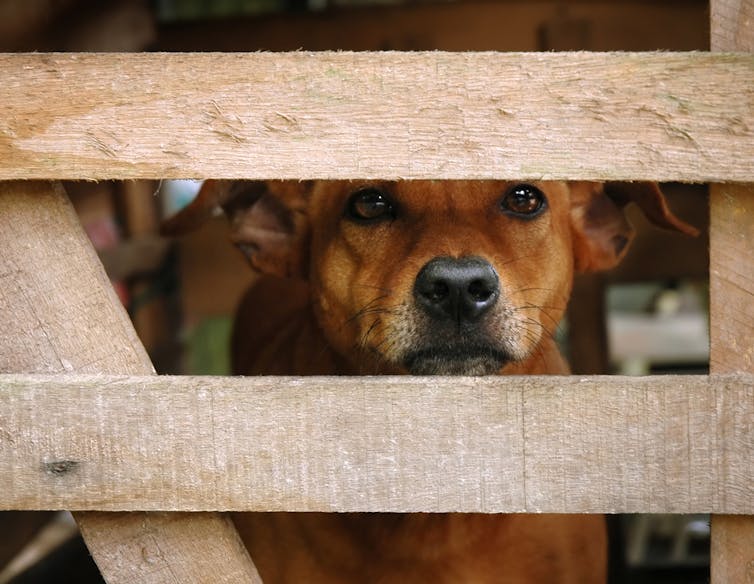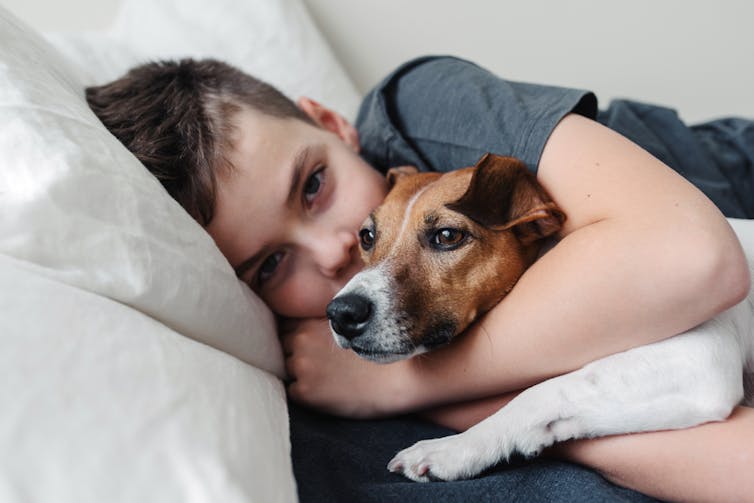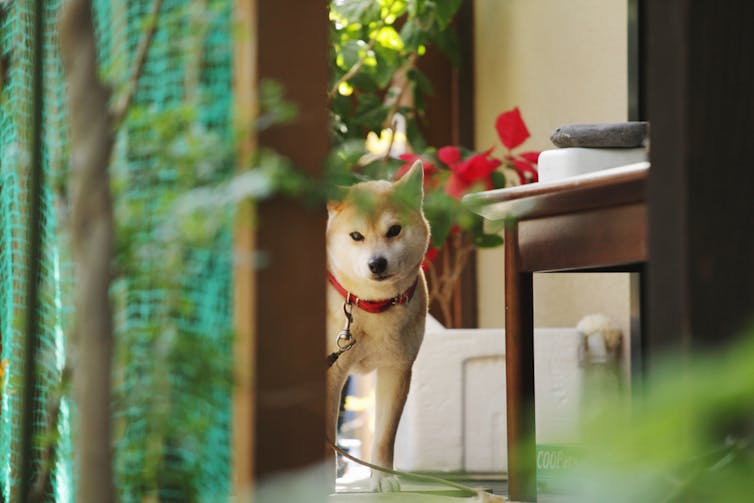8 things we do that really confuse our dogs
- Written by Melissa Starling, Postdoctoral researcher, University of Sydney
Dog behaviour is extraordinarily flexible – this is why we can keep them in our homes and take them to cafes with us at the weekend.
Nevertheless, there are ways in which evolution has not equipped dogs for the challenges of living in our world, and puppies must learn how to cope.
These are some of the things we do they struggle to understand.
Read more: Is your dog happy? Ten common misconceptions about dog behaviour
1. We leave them alone
As born socialites, dogs make friends easily. Puppies are intensely interested in spending time with other dogs, people, and any species willing to interact with them socially. They usually play, rest, explore and travel with company. Yet we often leave dogs alone: at home, in kennels or the vet clinic. Sometimes, they feel left alone even when we go to places we usually go, even when we're just going to get their treats on a dog food store. Many shelter dogs developed the fear of being left behind by their owners, and you might have to find ways to calm them and let them know you will always come back.
In these situations, naive dogs can’t be sure we’ll ever return to collect them. Only after experience are they likely to expect a reunion, and even then, their experience depends on the context.
At home, we may try to enforce dog-free zones. Naturally, many dogs protest. How can they stay with their (human) social group when they’re separated behind impenetrable barriers (doors)? This explains why dogs so often demand to be let inside when their human family is there, and why those with separation-related distress frequently find some solace in being indoors.

Dogs want to be with their group (you) at all times. from www.shutterstock.com
2. We are visually driven
Dogs live in an olfactory world, while ours is chiefly visual. So, while TVs may offer a visual feast for humans, parks and beaches are an olfactory banquet for dogs.
An additional challenge is dogs move while investigating the world, whereas we often sit still. They may not relish the inertia we enjoy in front of a noisy, flashing light-box.
3. We change our shape and smell
Shoes, coats, wallets, briefcases, bags and suitcases: countless smells cling to these items after we take them into shops and workplaces, then back to our dogs. Cleaning products, soaps, deodorants and shampoos also change the scents our dogs are used to.
Towels, hats and bags change our shape when we’re using them. And when we’re pulling them on, jumpers and coats alter our visual outline and may catch dogs unaware.
Read more: Training my dog taught me that it's people who really need training
Dogs change their coats at least once a year. In contrast, we change our external cladding every day. This means the odours we carry are changing far more than dogs have evolved to expect.
In their olfactory world, it must be puzzling for dogs to encounter our constantly changing smells, especially for a species that uses scent to identify familiar individuals and intruders.
4. We like to hug
How humans use their forelimbs contrasts sharply with how dogs do. We may use them to carry large objects a dog would have to drag, but also to grasp each other and express affection.
Dogs grasp each other loosely when play-wrestling, and also when mating and fighting. Being pinned by another dog hinders a quick escape. How are puppies to know what a hug from a human means, when that behaviour from a dog might be threatening?

Dogs might feel threatened by our enthusiastic hugs. from www.shutterstock.com
5. We don’t like to be bitten
Play-fighting is fun for many puppies and helps them bond with other dogs. But they must monitor the behaviour of other dogs in play-fights and know when they’ve used their tiny, razor-sharp teeth excessively.
Humans are much more susceptible to pain from playful puppy jaws than other dogs are, and so we can react negatively to their attempts to play-fight with us.
Dogs interact with objects almost entirely with their muzzle. And to feed, they use their jaws, teeth and tongue.
Read more: Understanding dog personalities can help prevent attacks
Dogs also “mouth” other dogs when playing, expressing affection and communicating everything from “more” to “please don’t” to “Back off!”. So, naturally, they try to use their mouths when communicating with us, and must be puzzled by how often we take offence.
6. We don’t eat food from the bin
Dogs are opportunists who naturally acquire food anywhere they find it. In contrast, we present them with food in dishes of their own.
Puppies must be puzzled by our reaction when we find them snacking from benches and tables, in lunchboxes and kitchen bins. We should not be surprised when dogs unearth food we left somewhere accessible to them.
Read more: Whose best friend? How gender and stereotypes can shape our relationship with dogs
7. We share territories
We visit the territories of other dogs, bringing back their odours, and allow unfamiliar human and canine visitors to enter our dogs’ home. Dogs have not evolved to accept such intrusions and threats to their safety and resources.
We shouldn’t be surprised when our dogs treat visitors with suspicion, or when our dogs are treated with hostility when we bring them to the homes of others.

Dogs would not naturally share territories. from www.shutterstock.com
8. We use our hands a lot
Sometimes our hands deliver food, scratches, massages and toys. Other times, they restrain dogs, trim nails, administer ointments or tablets, and groom with brushes and combs that may pull hair.
No wonder some dogs grow to fear the human hand as it moves about them. We can make it easier for dogs to accept many types of hand-related activities if we train them to cooperate with rewards.
But humans often misread their fear and may even greet it with violence which compounds the problem. Hand-shy dogs can easily become defensive and find their way into pounds and shelters, where life expectancy for nippers and biters is poor.
On the whole, dogs show a remarkable ability to adapt to the puzzles we throw at them. Their behavioural flexibility offers us lessons in resilience and how to live simply and socially. Our challenge is to understand the absence of guile and malice in everything they do.
Authors: Melissa Starling, Postdoctoral researcher, University of Sydney
Read more https://theconversation.com/8-things-we-do-that-really-confuse-our-dogs-122616


















